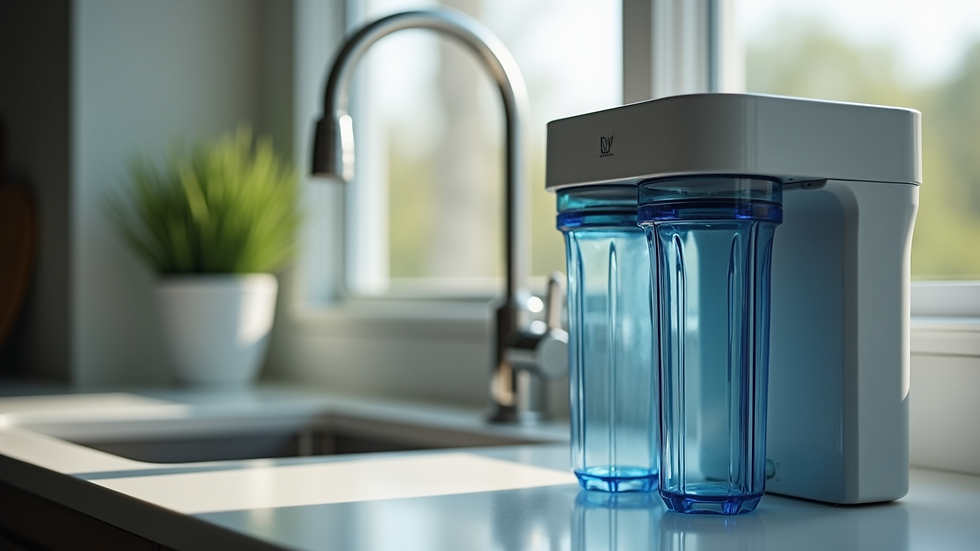Why Water Filtration Matters: What’s Really in Your Tap Water?
- forgachplumbing
- Jun 17
- 4 min read

Access to clean, safe drinking water is essential for good health. Unfortunately, many households rely on tap water that might not be as safe as expected. While municipal water systems are regulated, a variety of factors can still impact water quality. This is where water filtration becomes crucial for protecting your health and well-being. In this post, we’ll discuss the importance of water filtration and what contaminants you might find in your tap water.
Understanding Tap Water Composition
Tap water contains numerous minerals, chemicals, and potential pollutants. Although municipal systems treat water, several factors can affect its overall quality.
The source of tap water varies—some comes from lakes, others from rivers or underground aquifers. Each source carries its own set of risks. Local authorities regularly test water quality, providing insight into its safety, but not all contaminants are easily detectable.
Regulatory agencies like the Environmental Protection Agency (EPA) set standards for tap water, yet some harmful substances can go unnoticed. Aging pipes, agricultural runoff, and industrial waste contribute to a long list of potential contaminants, including heavy metals, bacteria, and chlorine byproducts.
In fact, a study by the Natural Resources Defense Council revealed that nearly 77 million Americans were served by water systems that violated federal health standards in 2015. This alarming statistic highlights the importance of being aware of what’s in your tap water.
Common Contaminants in Tap Water
Awareness of potential pollutants in tap water is crucial for recognizing the need for filtration.
Heavy Metals
Heavy metals such as lead, arsenic, and mercury can enter tap water through old plumbing, industrial waste, and agricultural runoff. For instance, a report from the American Society of Civil Engineers noted that over 6 million homes in the U.S. have lead pipes. Lead exposure is especially harmful to children, as it can disrupt brain development and lead to lifelong health issues.
Chlorine and Chloramine
Municipalities often use chlorine and chloramine as disinfectants to kill harmful bacteria and pathogens. While effective, these chemicals can create unpleasant tastes and odors, and they may produce harmful byproducts when they react with organic materials in water. Long-term exposure to chlorinated water has been associated with various health issues, including increased cancer risk.
Microorganisms
Despite thorough treatment processes, microorganisms like bacteria, viruses, and protozoa can sometimes evade detection. For example, Cryptosporidium and E. coli are common pathogens that have caused outbreaks of severe gastroenteritis. A 2019 CDC report indicated that 33 outbreaks of waterborne illness occurred in the U.S., emphasizing the ongoing risk of microbial contaminants in drinking water.
The Benefits of Water Filtration
With an understanding of the risks involved, let’s explore why installing a water filtration system in your home is a smart move.
Improved Taste and Odor
One of the first benefits you may notice after installing a water filtration system is enhanced taste and smell. Filtered water often tastes fresher and is more enjoyable to drink. Studies have shown that people are more likely to stay hydrated when they like the taste of their water.
Removal of Contaminants
Many filtration systems can effectively remove harmful contaminants, including heavy metals, sediment, and microorganisms. For instance, reverse osmosis systems can eliminate up to 99% of lead and other pollutants. Activated carbon filters are effective against chlorine and some microorganisms, while UV filters can neutralize bacteria and viruses.
Cost-Effective
Although there's an initial investment in a filtration system, the long-term savings can be substantial. The average American spends around $125 a year on bottled water. A filtration system can supply an abundant amount of clean water at a fraction of that cost, saving you money over time.
Environmental Impact
Using a water filter significantly reduces your reliance on bottled water, decreasing plastic waste. According to the Earth Day Network, around 1 million plastic bottles are purchased every minute globally. By filtering your tap water, you help mitigate this environmental crisis while enjoying clean, fresh water without the added plastic waste.
Choosing the Right Filtration System
Selecting the right filtration system requires consideration of your household’s specific needs. Here’s how to make an informed choice:
Research Local Water Quality
Before deciding, it’s vital to understand your local water quality. Conducting a water quality test can reveal which contaminants are present in your tap water. This knowledge will help you select a filtration system that effectively addresses those specific concerns.
Explore Available Options
There are many filtration systems on the market, including simple pitcher filters and advanced reverse osmosis systems. Evaluate the effectiveness of each option in removing specific contaminants, their maintenance needs, and overall costs. For example, a countertop reverse osmosis system may cost more upfront but provides thorough filtration compared to a basic pitcher.
Consult Customer Reviews
Customer testimonials can be invaluable. Look for reviews that discuss performance, reliability, and user-friendliness. A highly recommended filtration system can ensure you choose a quality product tailored to your needs.
Key Takeaways
Water filtration is essential for ensuring safe and high-quality drinking water.
Given the numerous contaminants potentially found in tap water, investing in a reliable filtration system delivers peace of mind and health benefits. It not only enhances the taste and smell of your water but also effectively removes harmful pollutants.
As consumers become increasingly aware of water quality issues, a water filtration system is a smart investment in health and environmental sustainability. Prioritizing clean water allows you to positively impact both your health and your ecological footprint.

By filtering tap water, you are not just investing in your health—you are helping to create a cleaner, more sustainable future.




Comments